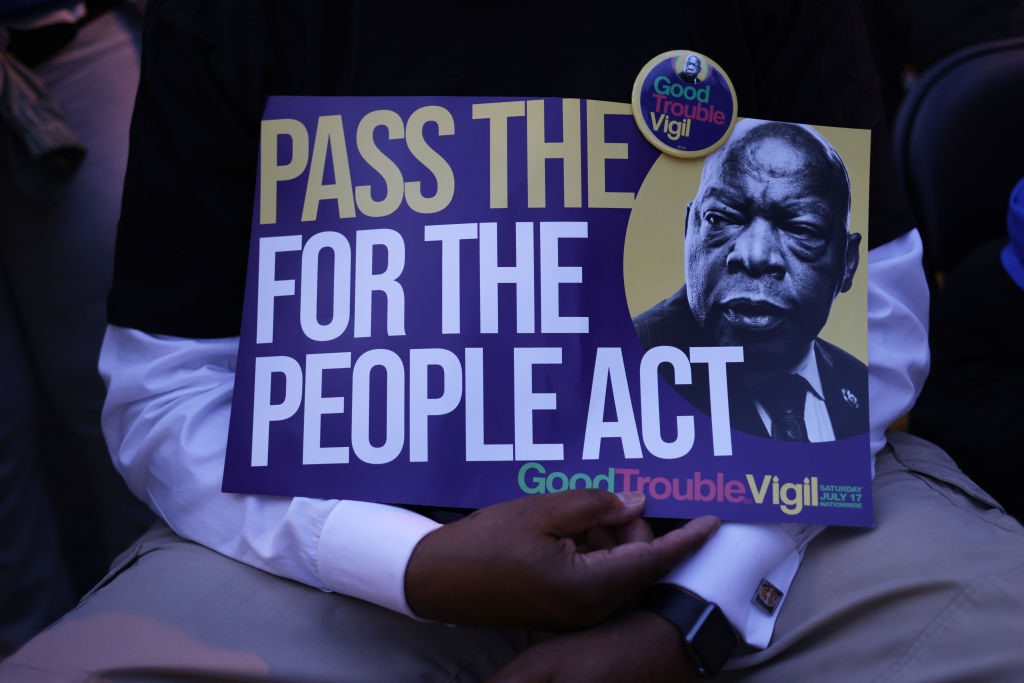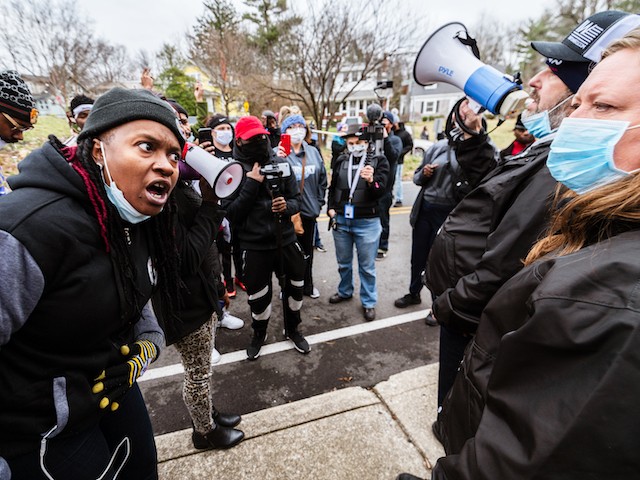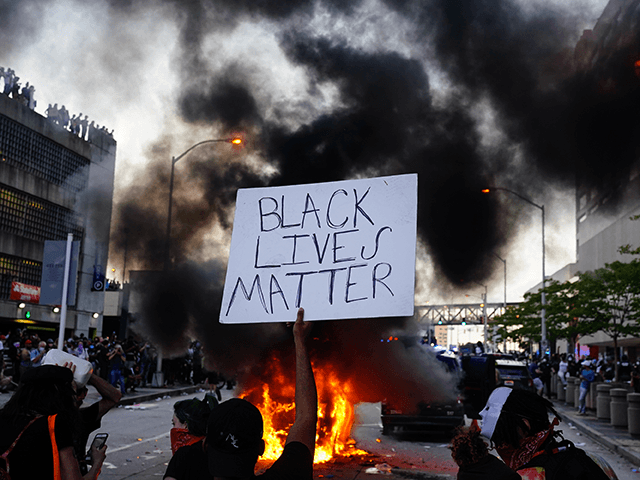Indiana Attorney General Todd Rokita issued an official advisory opinion designating the Black Lives Matter Global Network Foundation as “...
Indiana Attorney General Todd Rokita issued an official advisory opinion designating the Black Lives Matter Global Network Foundation as “unequivocally a political organization.”
In a letter exclusively obtained by Breitbart News on Wednesday, Rokita wrote in response to a request from two state legislators — Sen. John Crane [R-Brownsburg] and Rep. Michelle Davis [R-Whiteland] — and specifically advised Indiana public schools on how Black Lives Matter [BLM] should be treated in educational settings. Rokita notably warned that, as a political organization, promoting or displaying materials related to the movement “could create a liability for schools and could violate the First Amendment.”
“School corporations should be cognizant that promoting or displaying some politically based materials while prohibiting the promotion or display of others could be seen as arbitrary and capricious and could also be violative of the First Amendment. School corporations need neutral, uniform policies that are applied in a consistent manner,” Rokita wrote in part.
Rokita’s Reasoning
The attorney general broke down how BLM has shifted from “issue advocacy” to blatant “political activity,” a discrepancy which he argued invalidates previous advisement from the United States Office of Special Counsel [OSC] classifying the organization as advocacy-based rather than politically-based. ” Rokita pointed out that the OSC, which was strictly referring to whether federal employees via the Hatch Act could engage in BLM activities on site during working hours, said its guidance was based upon BLM activities “at the time of writing.” In its letter, the OSC acknowledged that if BLM’s activities changed in the future, then OSC “would reevaluate the group.”
“Subsequent political activities of BLM have caused this analysis to shift, while supporting a conclusion that the original determination by OSC is outdated,” Rokita wrote.

A voting rights activist holds a sign that reads “Pass The For The People Act” as he takes part in a “Good Trouble Candlelight Vigil for Democracy” at Black Lives Matter Plaza July 17, 2021 in Washington, DC. (Alex Wong/Getty Images)
Rokita specifically cited the developing of the BLM political action committee [PAC] in October 2020, which while separate from the organization, was founded by a former executive director and co-founder of BLM, “making it further difficult to argue the two are separate and distinct.”
The BLM PAC engages in explicit political activity by promoting its inaugural list of political candidate endorsements and raising funds to “actively engage” in the 2020 election, according to the opinion. Its 2020 Impact Report reportedly notes the PAC’s endorsement of several Democrat candidates, including references to voting for now Democrat President Joe Biden.
“Given the additional activities, post-July 14, 2020, that now put BLM squarely in the classification of a political organization, any reliance on the OSC guidance memo by schools (or the Indiana Department of Education (“IDOE”), to the extent it had relied on the memo in the past) is no longer valid,” Rokita wrote. ” As a result, the OSC guidance should not be relied upon by school districts or the IDOE in any way. Regardless of the OSC memorandum, BLM’s activities since July 2020 indicate its intent to become more politically oriented and the Indiana Office of the Attorney General considers it to be ma political organization.”
Rokita went on to explain how BLM’s designation as a political organization has ” First Amendment implications” for teacher-led and student-led speech an expression on school grounds and at school sponsored events.
Political Speech and Education
Concerning teacher-led speech and expression in schools, Rokita noted that “courts have held that educators are paid to teach the curriculum adopted by the school district, not substitute their own opinion or lessons, as children have no choice but to listen to the teacher’s speech.”
He wrote in part:
The First Amendment protections do not permit teachers to “present personal views to captive audiences against the instructions of elected officials” and doing so runs the risk of indoctrination. Id. at 479, 480. As is evident, there is a strong public policy reason for circumscribing the First Amendment protections of teachers while they are in the educational setting.
While most cases have involved actual speech, it follows that the same analysis would apply to the display or exhibition of other material as well. Students are “captive audiences” in the classroom regardless of whether the teacher is speaking, so whatever is displayed in the classrooms, hallways, or on cafeteria walls, the students are exposed to those messages. They are subject to the announcements over the loudspeakers, television screens, and tablets. Students are at the mercy of what the teacher displays in his or her classrooms or places in the lessons, so like “speech,” political expression would also be circumscribed under this same rubric.
Rokita stated that teachers may speak about political matters as citizens for the purposes of public concern, which is protected speech, but may not speak on such matters “in the course of his or her official duties” as an educator.
Students have a little more leeway, per the landmark Supreme Court case, Tinker v. Des Moines Independent Community School District, which defined the First Amendment rights of students in public schools. In the case, the school had banned students from wearing black armbands as a silent protest of the Vietnam War, yet had simultaneously allowed students in that same district to wear buttons relating to national political campaigns, and even the Iron Cross, a symbol of Nazism. The Court. “took issue that the policy prohibiting the wearing of armbands prohibited none of these items and only singled out the opposition to the Vietnam War,” Rokita said.

A Black Lives Matter activist argues in front Sen. Majority Leader Mitch McConnell’s vandalized home on January 2, 2021 in Louisville, Kentucky. Black Lives Matter demonstrators and right-wing DC Under Siege members gathered during the Won’t Back Down Rally to protest Sen. McConnell’s decision to block the most recent stimulus bill. (Jon Cherry/Getty Images)
“The crux of Tinker is not only can a school corporation not prohibit non-disruptive expression of political expression by students, it also cannot pick and choose what political speech it wants to promote and what speech it wants to suppress,” he said, adding that student political expression is generally protected if it is not disruptive or does not interfere with school activities. He also added, per court precedent, that schools are allowed to regulate the content of school-sponsored literature and other “expressive activities, as long as the regulation is “reasonably related to legitimate pedagogical concerns.”
Sen. John Crane [R-Brownsburg] and Rep. Michelle Davis [R-Whiteland] praised Rokita for providing “needed clarity about the underpinnings of the BLM movement.”
“I appreciate the Attorney General issuing this opinion regarding the Black Lives Matter movement,” Sen. Crane said. “At a time when too much of a student’s educational experience has been politicized, this opinion provides needed clarity about the underpinnings of the BLM movement, as well as reinforcing the importance of fair-minded presentations of all subject matter in our school classrooms. Our children in Indiana deserve a high-quality education that inspires their critical thinking in the pursuit of a society that truly dignifies all people.”
“Everyone should be treated equally and with respect,” Rep. Davis concurred. “However, the political activism and controversial ideology of this group is dividing communities rather than uniting them. While schools should provide a well-rounded education that includes differing views and perspectives, it’s not their role to persuade students to believe in one ideology over another.”
Black Lives Matter and Indiana Schools
The Black Lives Matter movement was around several years before the 2020 George Floyd riots. The organization first rose to notoriety in the United States following the 2013 acquittal of George Zimmerman, the same year it was founded. The Internal Revenue Service [IRS] granted Black Lives Matter Global Network Foundation 501(c)(3) nonprofit organization status in December of 2020 following an outpouring of support in the aftermath of the George Floyd’s death. BLM will soon be required to file public 990 forms, “revealing details of its organizational structure, employee compensation, programming and expenses,” the Associated Press reported.
Notably, “501(c)(3) organizations are absolutely prohibited from directly or indirectly participating in, or intervening in, any political campaign on behalf of (or in opposition to) any candidate for elective public office,” according to the IRS.
But besides its murky track record with donations, the organization and its founders have openly supported and praised dictators, admitted to being trained marxists, a co-founder was mentored by an ex-domestic terrorist, and the group actively espouses the tenets of Critical Race Theory, a hot button issue for voters going into the 2022 midterm elections.
Regardless of the organization’s background, leftists, Big Tech, Corporate America and schools across the country buckled to support BLM after the killing of George Floyd and the costly and deadly riots that ensued and destroyed some of America’s big cities. These actors simultaneously announced they were doubling down on efforts to address social justice and racism in what has often been referred to as a “racial reckoning.”

A man holds a Black Lives Matter sign as a police car burns during a protest on May 29, 2020 in Atlanta, Georgia. (Elijah Nouvelage/Getty Images)
Indiana schools have been no different. On June 25, 2020, Indiana Public Schools, which is the largest school district in Indianapolis, issued a “Black Lives Matter” resolution. The resolution espouses core issues of Critical Race Theory, including “white supremacy,” “systemic racism,” “collective failure,” “racial equity,” and other culturally marxist ideals. The resolution also guaranteed the passage of “Board Policy 1619 — Racial equity mindset, commitment, and actions.”
Another high-profile incident occurred in Indiana’s Hamilton Southeastern School District. Hamilton Southeastern Superintendent Allen Bourff, in a letter, urged educators to “teach Black Lives Matters as a political issue, not a social one,” the Indy Star reported. He later apologized after parents expressed outrage.
Overall, the National Education Association [NEA] and the National School Boards Association, two of the largest education unions in the country, both with chapters in Indiana, have repeatedly pushed for teachers to be versed in Black Lives Matter and Critical Race Theory, and for it to influence the way they teach — meaning both are actively being promoted in public schools.
No comments